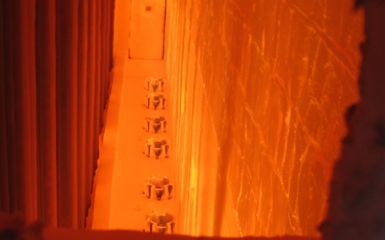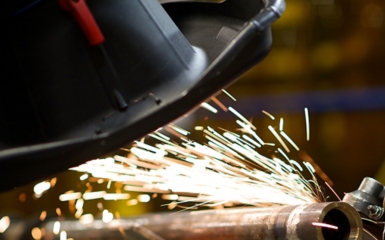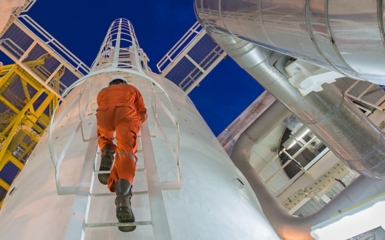As industries worldwide look for sustainable energy solutions, Hydrogen (H2) is emerging as a promising alternative to traditional fossil fuels. At John Zink, we’re leading the charge in innovating combustion technologies that meet the evolving needs of our clients. One area of focus is converting tangentially fired boilers from natural gas to hydrogen. This process offers exciting possibilities but comes with its own set of challenges.
Why Hydrogen?
Hydrogen’s combustion properties are notably different from those of traditional fossil fuels like natural gas. For one, hydrogen has a much faster flame speed and broader flammability limits. It also produces no soot, carbon monoxide (CO), or volatile organic compounds (VOCs). These characteristics make hydrogen an attractive option for reducing emissions and improving combustion efficiency.
However, these same properties also pose significant design challenges. Tangentially fired boilers, traditionally used with fossil fuels, require careful modifications to handle hydrogen effectively.
Key Challenges in Hydrogen Conversion
When transitioning from natural gas to hydrogen, several design considerations need to be addressed:
- Flame Speed: Hydrogen’s flame speed is significantly higher than that of natural gas. In fact, at a typical operating temperature, hydrogen’s flame speed can be seven times faster than methane. This means that flame fronts could propagate more quickly, potentially leading to instability and localized overheating in the boiler.
- Flammability Limits: Hydrogen has a wider range of flammability compared to natural gas. This can create a more extensive zone where the fuel mixture is combustible, increasing the likelihood of unintended ignition points within the boiler.
- Heat Transfer: Hydrogen burns hotter than natural gas, which can impact the heat transfer dynamics within the boiler. This change in temperature distribution may require adjustments in burner tilt, modifications to burner materials, or even alterations to the boiler’s superheating mechanisms to prevent damage.
- NOx Emissions: While hydrogen combustion eliminates CO and VOC emissions, it can increase nitrogen oxides (NOx) due to the higher combustion temperatures. Addressing NOx emissions requires careful burner design to mitigate this effect.
Practical Solutions and Testing
To address these challenges, we conducted rigorous testing at our Research & Development Test Center in Tulsa, Oklahoma. We developed a specialized burner capable of handling the unique properties of hydrogen. Our tests revealed several critical insights:
- Burner Design: Fuel nozzle modifications have reduced the risk of overheating due to the increased flame speed and wider flammability limits, whilst maintaining performance on natural gas fuels. This new design reduced the risk of overheating and improved overall burner stability.
- Material Upgrades: The transition to hydrogen required upgrading burner materials to higher grade stainless steel. This change helped withstand the higher operating temperatures without compromising the structural integrity of the burner.
- NOx Reduction Strategies: We tested various configurations to minimize NOx emissions. The optimized design reduced NOx output by about 23% compared to conventional setups, making hydrogen combustion more environmentally friendly.
- Transition Friendly: Our T-Fire technology has been proven from 100% natural gas up to 100% Hydrogen, meaning our market leading Tangential Fire gas burner technology will be able to support end users through the energy transition.
The Road Ahead
Hydrogen is a key player in the future of clean energy, and tangentially fired boilers can be adapted to leverage this fuel’s benefits. However, the transition isn’t without its hurdles. At John Zink, we remain committed to developing practical solutions that help our clients make this switch smoothly. Our ongoing research and testing ensure that we’re not just reacting to industry trends but actively shaping them.
If you’re interested in learning more about hydrogen conversions or need assistance with your combustion systems, John Zink is here to help.



